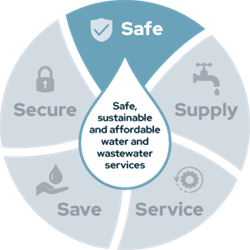Recycled water
Recycled water is wastewater from homes and business that has been treated to a high standard to remove contaminants.
Once treated, recycled water can be used for purposes such as:
- irrigating agricultural crops, parks, gardens, golf courses
- dust control on industrial sites
- industrial cooling
- non-potable household uses (toilet flushing, laundry and garden).
Council utilises recycled water to help support more sustainable, long-term water solutions and help conserve the Tweed’s precious drinking water.
Around 7.5% of treated wastewater is reused in the Tweed, which sits just below the national average of 9%.
Council has been recycling water since the 1980s. The amount of water recycled in the Tweed has increased over the last decade.
Water recycling is becoming an important part of managing our water resources. Access to alternative safe water sources is important in times of drought, and pollutants such as nitrogen and phosphorus can be beneficial for irrigation.
Maximising recycled water use is a key action in Council's Integrated Water Cycle Management and Demand Management strategies.
Is recycled water safe?
Yes. Recycled water is treated to a high standard to make sure it's fit for purpose. Recycled water schemes are approved by regulatory authorities and ongoing monitoring and reporting is required.
Current recycled water schemes
Council's urban water cycle includes several recycled water schemes. Click the schemes below for details.
Condong Co-generation Facility
Recycling: Up to 584ML/annum.
Status: Operating since 2007.
Information: Council has an agreement with Delta Electricity and Sunshine Sugar for the supply of recycled water for a Cogeneration Facility at Condon Mill. The recycled water is for cooling tower water and boiler feed make up, and uses all average dry weather flow from the Murwillumbah Sewage Treatment Plant.
Coolangatta Tweed Heads Golf Club
Recycling: 250ML/annum
Status: Operating since 1987
Information: The Golf Club installed its own pump equipment and pipeline from the Banora Point treatment plant to the golf course site. The current agreement with the Golf Club is for the provision of up to 2 Megalitres of recycled water per day for irrigation purposes. This equates to approximately 10 per cent of the total production from Banora Point Sewage Treatment Plant.
Les Burger Field, Bogangar
Recycling: Up to 55KL/day
Information: Les Burger Field was operating an irrigation system with potable water for approximately 10 years. By substituting recycled water at the ground, the water savings are the equivalent to supplying water to 230 new homes (240kl/property per annum).
Tyalgum Eucalyptus Tree Plantation for Currumbin Wildlife Sanctuary
Recycling: Nil
Status: The concept design is underway.
Information: Given the success of the scheme at Uki, Council and Currumbin Wildlife Sanctuary are investigating carrying out similar works at Tyalgum to provide additional Koala fodder.
Tyalgum Pasture Irrigation
Recycling: Up to 25ML/annum.
Status: Operating since 1987
Information: The recycled water from the Tyalgum Treatment Plant is used to irrigate adjacent pastures. With an average daily flow of 50 kilolitres, approximately 95 per cent of the plant’s production is used.
Uki Eucalyptus Tree Plantation for Currumbin Wildlife Sanctuary
Recycling: Up to 9ML/annum
Status: The Uki Sewerage scheme was commissioned in 2004.
A 10 Megalitre wet weather effluent storage dam was constructed to limit discharges to the adjoining creek to extreme wet weather events only.
Information: Over 99 per cent of the recycled water produced by the plant is used for irrigating eucalyptus trees in a joint venture with Currumbin Wildlife Sanctuary, where the trees are harvested by the sanctuary for koala food.
Financial Assistance for Recycled Water Schemes
Council is committed to supporting sustainable water use in the Tweed. As part of this commitment, we offer financial assistance to eligible businesses and customers who are proposing purified recycled water schemes that align with Council’s strategic goals.
This assistance helps offset the upfront costs of planning, designing and building recycled water infrastructure. This encourages more projects that benefit the community, the environment and the local economy.
For full details, read our Financial Assistance to Proponents of Recycled Water Schemes policy.(PDF, 165KB)
If you are considering a recycled water scheme and would like to find out whether your project may be eligible for assistance, please contact us for more information and guidance.
